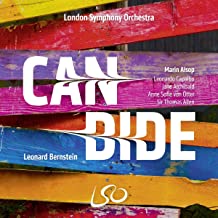Leonard Bernstein’s Candide is utterly lovable: witty, wise, bawdy, meta, philosophical, whimsical. After a brief run elsewhere its life began in 1956 on Broadway as a comic operetta. Lillian Hellman, Richard Wilbur, John Latouche, and Dorothy Parker all had their fingers in it; eventually Stephen Sondheim joined the crew. It ran for 73 performances–a flop. But, as I said, everyone loves Candide so much that it has been doctored up to almost 500 pages of score by now–numbers added, numbers subtracted, numbers re-numbered. Few of the ideas have been bad, but there is no single performing edition: slim it down and many feel cheated; include every number and what should be witty and light is bloated.
This edition was recorded at London’s Barbican in December, 2018, and it’s chock-full but hardly definitive. Marin Alsop, a protégé of Bernstein’s and a fine conductor, has prepared the edition. Presented as a concert, a narrator was needed, and the fine British bass-baritone, Thomas Allen, does a wonderful job of scene-setting, but the text is too wordy and almost immediately you wish he’d get on with it.
Alsop uses an edition very much like the one Bernstein himself recorded in 1989, which was based on a Scottish Opera production by John Mauceri. It is the only time Bernstein ever conducted the score, and my guess is that for once he wanted the whole shebang in one place and wished to validate it as an opera. Among his miscalculations–and this is true of Alsop’s leadership as well–is forgetting that it was truly meant as a Broadway show called an operetta. The result is a full-blown epic, its picaresque panoply about to explode like a colorful hot-air balloon.
Bernstein opted for opera singers–grand ones at that (Jerry Hadley, June Anderson, Christa Ludwig, the latter quite devastatingly brilliant as the Old Lady)–and slow tempos, turning even the spectacular overture, a diamond of the art form that shines as brightly as that of Ruslan and Ludmila, The Bartered Bride, and of course, Le nozze di Figaro, into something that needs to be examined under a microscope. Alsop is even less adventurous throughout and she cuts bits of the score. Either overwhelm as a work of scholarship or present as a pageant, but you can’t have both.
There’s little to argue with the singing: Leonardo Capalbo is good enough as Candide but lacks Jerry Hadley’s wide-eyed delivery. Anne Sofie von Otter is a superb artist in good voice, but she’s no Christa Ludwig and remains above it all. Jane Archibald, like the larger-voiced June Anderson for the composer, has all the notes for the fiendish “Glitter and be Gay” but little of the down-and-dirty irony. Just listen to the perfect Barbara Cook, devoid of pretense, and you’ll feel you know who Cunégonde is. Marcus Farnsworth’s Maximillian (and other parts) is articulate and draws fine characters.
Let’s face it, the excerpts CD from the Original Broadway show gives the best impression of what Candide actually is, albeit at only 56 minutes. The other hour’s worth of music and text are good to have, but what a tender, thoughtful joy the original is! The ravishing “Make our garden grow”, the finale that Mahler never wrote, goes straight to the heart when not over-inflated. Bernstein and Alsop almost make it into a dirge: it’s not the end, it’s a new beginning.
































